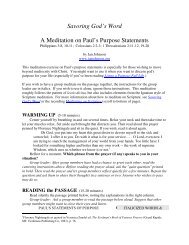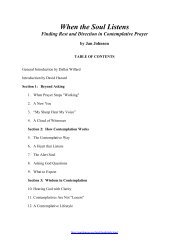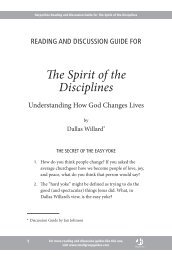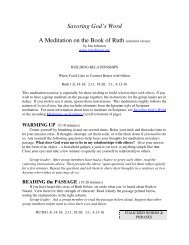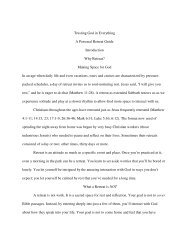FREE Download - Jan Johnson
FREE Download - Jan Johnson
FREE Download - Jan Johnson
You also want an ePaper? Increase the reach of your titles
YUMPU automatically turns print PDFs into web optimized ePapers that Google loves.
People who have gotten along fine with their parents or siblings now feel these family member<br />
are ignoring them or demanding too much of them. Leaving a towel on the floor or not cleaning<br />
up messes, begin to bother them like never before. But instead of saying nothing, they can't help<br />
but say something. Family members may feel they can't do anything right.<br />
Inability to follow through<br />
Nothing gets finished: deadlines are missed; promises are broken; ethics that once mattered are<br />
violated. The conscience catches up with them and says, Is this the kind of person you want to<br />
be? They don't like the way they're behaving but they can't find the energy or courage to change.<br />
Feeling as if they're faking life<br />
The listlessness gets annoying as people attend meetings and activities they hate and compliment<br />
people for qualities they don't even respect. Thoughts and actions seem to be coverups for true<br />
desires. It becomes apparent they're not doing what they want to do.<br />
SWALLOWED UP IN CRISIS<br />
We do amazingly well at ignoring this restlessness and even dismissing crises, but if we're given<br />
enough time to think, it catches up with us. Vacations with unstructured time can be unpleasant.<br />
When friends or relatives come to visit, we may take stock of ourselves in relation to them and<br />
not like what we see. Job lay-offs bring back past feelings of loneliness and worthlessness. We<br />
find ourselves feeling like the same kid who used to lie in bed and stare at the ceiling, wondering,<br />
What will become of me?<br />
These emotional upheavals are sometimes triggered by transitions between life stages,<br />
which come around every ten to fifteen years for most people in western culture. At these forks<br />
in the road, we re-evaluate our life choices and ponder whether they turned out as we thought<br />
they would. We ask, What do I really give to and get from my spouse, children, church, friends,<br />
work, community--and self? How do I live up to my commitments (career, marriage, kids), but<br />
make changes I need to make? If those questions become disturbing, we're likely to go on to<br />
face those core questions, as well: What must I do to feel loved? What must I do to feel valued?<br />
Life transitions create a setting for intense soul-searching which result in three stages:<br />
• leaving old values behind<br />
• choosing new values<br />
• trying to make those values work.<br />
If we don't have the communication skills or self-confidence to make the changes we think<br />
we need to make, we can fall into despair. This is what Matt did when he kept changing jobs<br />
(chapter 2). It gets even worse if we find ourselves in an intolerable situation (demeaning job,<br />
abusive marriage) and have no idea where we'll find the energy and courage to change it.<br />
Sometimes people respond by changing nearly everything. They switch careers, leave a<br />
spouse, build a wall between their children and themselves, quit groups they've been a part of for<br />
years, stop or start going to church. They look for a new niche in life by developing new skills,<br />
establishing a different home base, and becoming an important member of a group they value.



